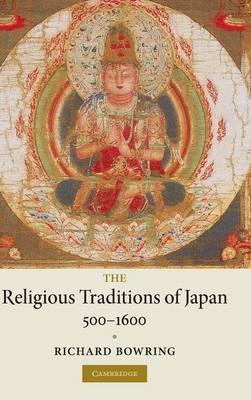
The Religious Traditions of Japan 500–1600
Cambridge University Press (Verlag)
978-0-521-85119-0 (ISBN)
Richard Bowring describes in outline the development of Japanese religious thought and practice from the introduction of writing to the point at which medieval attitudes gave way to a distinctive pre-modern culture, a change that brought an end to the dominance of religious institutions. A wide range of approaches using the resources of art, history, social and intellectual history, as well as doctrine is brought to bear on the subject. The result is as full a picture as possible of the richness of the Japanese tradition as it succeeded in holding together on the one hand Buddhism, with its sophisticated intellectual structures, and on the other hand the disparate local cults that eventually achieved a kind of unity under the rubric of Shintō. An understanding of this process of constant and at times difficult interaction is essential to a deeper appreciation of Japan's history and its cultural achievements.
Richard Bowring is Professor of Japanese Studies at the University of Cambridge and Master of Selwyn College, Cambridge. He is co-author of The Cambridge Encyclopedia of Japan (1993) and has written a number of Japanese Language textbooks.
Introduction; Part I. The Arrival of Buddhism and Its Effects (c.538–800): 1. The introduction of Buddhism; 2. Creating a dynasty; 3. Buddhism and the early state; 4. Monuments at Nara; Part II. From Saichō to the Destruction of Tōdaiji (800–1180): 5. The beginnings of a 'Japanese' Buddhism: Tendai; 6. The beginnings of a 'Japanese' Buddhism: Shingon; 7. Buddhism and the state in Heian Japan; 8. Shrine and state in Heian Japan; 9. The rise of devotionalism; 10. A time for strife; Part III. From the Destruction of Tōdaiji to the Fall of Godaigo (1180–1330): 11. For and against exclusive practice of the nenbutsu; 12. Religious culture of the early 'middle ages'; 13. Chan Buddhism; 14. Zen Buddhism; 15. Reform from within and without; 16. The emergence of Shintō; 17. Taking stock; Part IV. From the Fall of Godaigo to the Death of Nobunaga (1330–1582): 18. Two rival courts; 19. Muromachi Zen; 20. The end of the medieval; 21. Appendix: reading Shingon's two mandala.
| Erscheint lt. Verlag | 15.9.2005 |
|---|---|
| Zusatzinfo | 11 Maps; 30 Halftones, unspecified; 4 Line drawings, unspecified |
| Verlagsort | Cambridge |
| Sprache | englisch |
| Maße | 152 x 229 mm |
| Gewicht | 840 g |
| Themenwelt | Geisteswissenschaften ► Geschichte ► Regional- / Ländergeschichte |
| Geisteswissenschaften ► Religion / Theologie ► Buddhismus | |
| Geisteswissenschaften ► Religion / Theologie ► Weitere Religionen | |
| ISBN-10 | 0-521-85119-X / 052185119X |
| ISBN-13 | 978-0-521-85119-0 / 9780521851190 |
| Zustand | Neuware |
| Haben Sie eine Frage zum Produkt? |
aus dem Bereich


